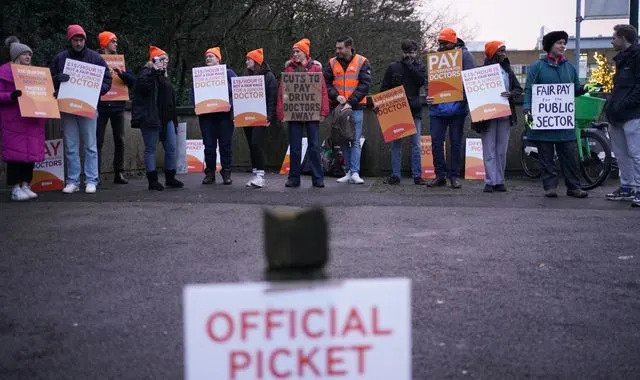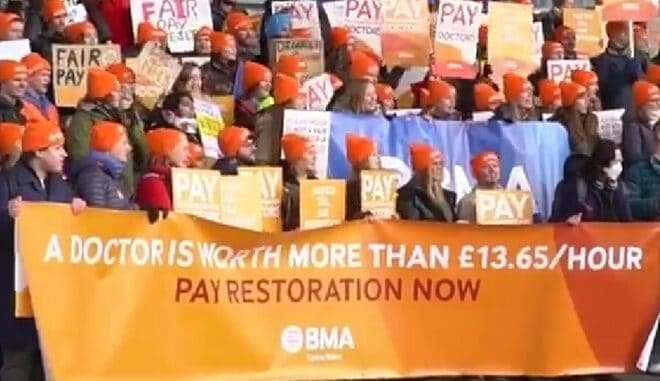Sky News
Fri, 23 February 2024

Patients face further major disruption as junior doctors in England begin a five-day strike in their ongoing pay row with the government.
Tens of thousands of hospital appointments are set to be cancelled or postponed as a result of the latest walkout which began at 7am on Saturday and will stretch until 11.59pm on Wednesday.
It is the 10th stoppage by junior doctors since last March and follows the longest strike in NHS history in January, which lasted six full days.
"The government could have stopped these strikes by simply making a credible pay offer for junior doctors in England to begin reversing the pay cuts they have inflicted upon us for more than a decade," Dr Robert Laurenson and Dr Vivek Trivedi, co-chairs of the BMA junior doctors committee, said.
"The same government could have even accepted our offer to delay this round of strike action to give more space for talks - all we asked for in return was a short extension of our mandate to strike.
"The fact that ministers have chosen strike action over what could have been the end of this year's pay dispute is disappointing to say the least."
The BMA also expects its strike mandate to be renewed raising the prospect of further industrial action.
Health Secretary Victoria Atkins said: "I want to see doctors treating patients, not standing on picket lines.
"In negotiations with the BMA junior doctors committee, we made it clear we were prepared to go further than the pay increase of up to 10.3% that they have already received. They refused to put our offer to their members.
"More than 1.3 million appointments and operations have already been cancelled or rescheduled since industrial action began - five days of further action will compound this.
"The NHS has robust contingency plans in place, and it is vital that people continue to come forward for treatment. But no one should underestimate the impact these strikes have on our NHS.
"So again, I urge the BMA junior doctors committee to call off their strikes and show they are prepared to be reasonable, so that we can come back to the negotiating table to find a fair way forward."
Junior doctors have received a pay rise averaging nearly 9% this financial year.
The BMA has been seeking a 35% "pay restoration" as its starting position, but has said it is willing to negotiate.
Junior doctors make up around half of all doctors in the NHS and have anywhere up to eight years' experience working as a hospital doctor, depending on their specialty, or up to three years in general practice.
Wes Streeting, Labour's shadow health secretary, described the latest round of strikes as having "a devastating impact on patients" but said Prime Minister Rishi Sunak was refusing to negotiate.
NHS national medical director Professor Sir Stephen Powis said it is "extremely concerning" that strike action and disruption "are becoming a new normal".
"For the equivalent of more than one in every 10 days last year, the NHS has had to effectively stop carrying out most routine appointments to prioritise emergency care," he added.
Deputy chief executive of NHS Providers Saffron Cordery said: "We can't go on like this. Wave after wave of strikes saps the morale of staff and impacts patients.
"Trust leaders want to get on with the job of giving patients first-class care instead of having to spend too much time and energy planning for and coping with weeks of disruptive strikes."
Tenth round of junior doctors’ strike action set to go ahead from this weekend

Strike action by junior doctors will take place from 7am on Saturday (24 February) to midnight on Wednesday (28 February).
The British Medical Association says action is being taken because while workload and waiting lists are at record highs, junior doctors’ pay has been cut by more than a quarter since 2008.
Data shows NHS staff continue to contend with high demand for urgent and emergency care, with 89,377 ambulance handovers to hospitals last week, up 12% from 79,752 in the same week last year nationally.
By the end of the walk out hospital doctors will have taken 44 days or 1,056 hours of industrial action over the last year.
The British Medical Association says: “Progress was being made in talks but the Government failed to meet the deadline of 8 February to present a credible offer.
“In order to allow more time for negotiations to continue, we extended an offer to the Health Secretary to cancel this round of strikes before it was announced publicly if she agreed to extend the mandate for strike action for four weeks. Unfortunately she declined to do so leaving us no choice but to announce this final strike of our mandate.”
To mitigate the impact of strike action, trusts are putting in place measures to maintain care for those who need it urgently, and rescheduling planned appointments which are now unable to go ahead.
The previous round of industrial action by junior doctors took place in January. Junior doctors make up around half of all doctors in the NHS and have anywhere up to eight years’ experience working as a hospital doctor, depending on their specialty, or up to three years in general practice.
The NHS is advising the public to use 111 online as the first port of call for urgent but not life-threatening issues during industrial action so that they can be directed to the best place for their needs. Patients who need medical care should continue to use 999 or go to A&E as normal.
Patients who haven’t been contacted to say their appointment has been cancelled should also attend as normal.
Junior doctors in the NHS in England say they are taking strike action to:
- achieve full pay restoration to reverse the steep decline in pay faced by junior doctors since 2008/9
- agree on a mechanism with the Government to prevent any future declines against the cost of living and inflation
- reform the DDRB (Doctors’ and Dentists’ Review Body) process so pay increases can be recommended independently and fairly to safeguard the recruitment and retention of junior doctors.
No comments:
Post a Comment